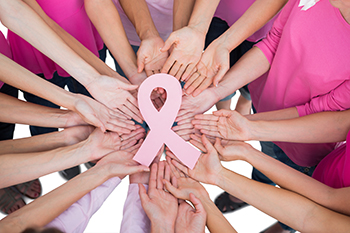
Female hands in a circle holding pink breast cancer ribbon
Ask an AMH Expert: The Importance of Screening Mammograms
with Cathy Clark, DNP, FNP-BC
There are so many things that I could discuss as a healthcare provider. However, a dear friend recently passed away after battling breast cancer and I am reminded of how important screening mammograms are. Many of us know someone that has, or had, breast cancer and know that each pathway is unique for that individual.
Why are mammograms so important?
The medical community acknowledges that screening is one of the best ways to identify someone at risk for breast cancer. We look at various factors, such as family history, signs and symptoms and age, which help us determine when screening begins.
At what age should I start getting mammograms?
Current guidelines recommended by the U.S. Preventive Services Task Force, for women considered average risk for breast cancer, are to begin screening at age 40 every two years until they are 74. However, if your mother was diagnosed with breast cancer at the age of 40, then recommendation is that the daughter should start screening at the age of 30, or more frequent screenings may be recommended based on your unique history. If dense breasts are present, then other screening methods might be recommended by the provider.
Other agencies have recommendations regarding screening and detailed information can be found. The National Cancer Comprehensive Network (NCCN) has the following recommendations regarding screening for variance in exams and age:
Average risk:
•Get an annual mammogram and physical exam.
•Consider a breast MRI if you have dense breasts.
High risk:
•Get an annual mammogram starting as early as age 30.
•Consider a breast MRI starting as early as age 25.
•Consider a physical exam every six to 12 months.
Risk assessment:
•Consider a breast cancer risk assessment by age 25.
•Discuss your risk with your primary care physician.
Screening recommendations:
•Screening mammograms can save lives and increase life years for patients with breast cancer.
•Screening should continue if a woman is in good health and is expected to live 10 years or longer.
Additional imaging:
•If you have dense breasts, you should consider a breast MRI or a whole breast ultrasound in addition to a mammogram.
The above recommendations are discussed in a booklet published by the
NCCN, and patients can access this information by signing in and creating a free account. The handbook that they publish is available to anyone that wishes to read more in-depth information about breast cancer.
Ashe Memorial Hospital has an excellent mammography department and offers screening 3-D mammograms, diagnostic mammograms, ultrasounds, and MRI’s of breasts. Services have grown at our community hospital and require minimal travel for screening services. They do accept insurance, but they also have a program for those women that do not have insurance but need a mammogram. You can ask about this option by inquiring about the
Women in Touch Fund.
About Cathy Clark, DNP, FNP-BC

Cathy Clark is family nurse practitioner that provides primary care services at Mountain Family Care Center, in Jefferson, NC. Cathy obtained a master of science in nursing from UNC Chapel Hill and graduated in 2006. She obtained her bachelor of nursing from UNC Charlotte in 2004 and her associate degree from Surry Community College in 1994. Cathy also has a bachelor of science from Appalachian State University.




